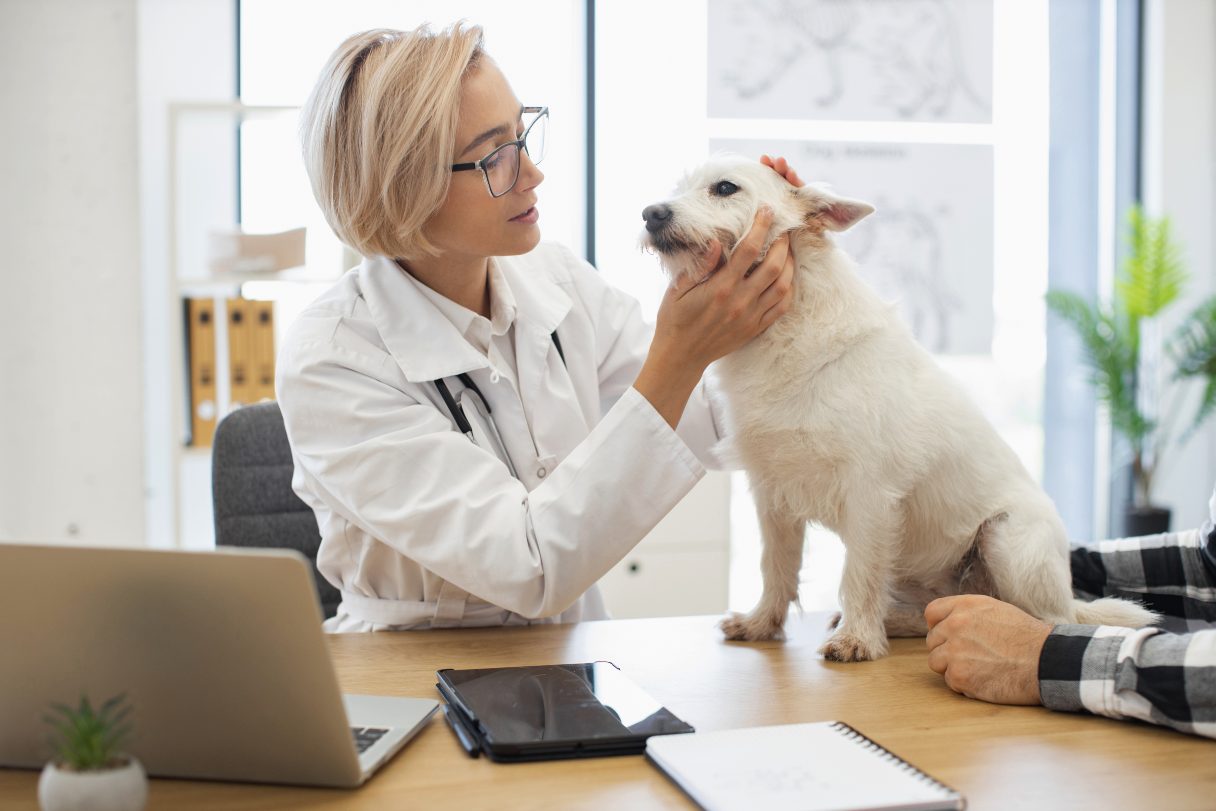What Is One of the Most Common Problems With Eye Health in Dogs?
Probably the most common eye problem is some form of conjunctivitis, which is the inflammation of the conjunctiva, the tissue surrounding the eye in the eye socket. Anything that might inflame this area could be a sign of an infection, allergy, or irritation. It also can be a manifestation of an upper respiratory infection.
What Are Some Symptoms of Conjunctivitis?
- Redness
- Tearing
- Discharge
How Do You Treat Conjunctivitis?
It depends on the source that's causing the inflammation. But some common treatments for conjunctivitis in dogs include:
- Ophthalmic solution
- Ophthalmic ointment
- Antibacterial solution
- Antibacterial ointment
When Do I Need To Take My Dog To The Vet?
If the dog experiences a little redness or discharge but is otherwise totally fine, you might give it a day or two to clear up on its own. But if you notice colored discharge, severe redness or swelling, or if your dog is rubbing their eyes and acting like it bothers them, it's bad enough to see your vet.
Could Conjunctivitis Be Passed On To Another Dog or Person?
If your dog has conjunctivitis, also known as pink eye, I would hesitate to recommend taking them to doggy daycare until a veterinarian has seen them and started treating the eye. Without knowing the cause of the inflammation, it might be best to keep the dog isolated until you're certain they're not contagious.
What Are The Signs Of Corneal Ulcers In Dogs?
- Squinting
- Redness
- Swelling
- Irritation
- Rubbing or other signs of pain
What Could Cause A Corneal Ulcer?
Short-faced breeds that bump into something that may irritate the eye don't have an opportunity to close their eyes like longer-nosed dog breeds. And then rubbing the irritation may cause an ulcer to develop. Another common cause is getting soap in the eyes while bathing and not rinsing well. Again, it's the dog rubbing the irritated eye that can create an ulcer.
Can Dogs Get Cataracts?
A cataract is a milky discharged debris within the eye lens itself. It becomes very obvious, looking almost like a marble inside the eye. While age-related cataracts are common, a young dog can get cataracts, especially if they have diabetes. Cataracts cause blindness and the key to preventing that is early diagnosis. The only real treatment option for cataracts is surgery.
Can You Expand On The Relationship Between Cataracts and Diabetes?
A dog with diabetes has abnormally high blood sugar, which acts as a wick, causing fluid to build up in the lens of the eye, turning into a cataract. So if I see a dog drinking a lot of water, urinating a lot, and developing cataracts, I'm thinking diabetes.
How Can You Tell the Difference Between a Cataract and a Cloudy Eye?
Your dog should be examined by a veterinarian or a veterinary ophthalmologist, which is a specialist that usually performs cataract surgery, to be certain. But there are a number of ways to tell the difference. One is an ocular fundic exam, which uses a special device to see through the lens to the back of the eye.
What Are Some Signs My Dog is Going Blind?
Typically, the dog seems to be bumping into things, or having trouble making a turn around a corner. The best vision test for your dog is to take a hallway and place some objects throughout to see if they can manipulate through. For example, try putting a chair here, a garbage can there, and a box over there. Then watch how your dog makes their way through the hallway.
What Are Some Signs of Glaucoma in Dogs?
Glaucoma is a very painful condition. The signs, again, will be squinting and the eye bulb itself is very large, larger than normal. If you are a seasoned pet parent and you've gently touched eyelids and pushed on the eyeball, dogs with glaucoma have very hard eyeballs.
What Are Some Treatment Options For Glaucoma?
- Eye drops
- Oral medications
- Surgical techniques
Can Dogs Have Eye Allergies?
Certain allergies can affect the eyes, though, as we discussed earlier, just conjunctivitis. You'll see some excessive tearing. You might see what we call injected sclera, which is when the white part of the eye becomes very, very red. You can see all the blood vessels coming in. So those might be signs of some sort of allergy.
Can You Explain Cherry Eye in Dogs?
Cherry eye is actually a prolapsed gland of the third eyelid, which is called the nictitans. If you gently press on a dog's eye, you'll see that eyelid for the middle come up and cover the eye. There's a gland inside, and the tissue in there is very reactive, to what, we don't always know. When that gland pops out, it looks like there's a cherry on the inside. Cherry eye is not an emergency, but it needs to be seen, and it often can be responsive to medications.
What Can Dog Parents Do to Help Prevent Eye Issues?
Keep the eyes clean. When there is a little bit of a discharge in the morning, wipe it away and see if it comes back. If it's continuous, you should see your vet. I would not recommend using an over-the-counter tear replacer. You really need to have a professional look at the eyes.
Financing Options For Dog Eye Healthcare
The CareCredit credit card can help you pay for eye exams and treatments, including medications and eye surgery.** It can also be used to pay for regular vet visits, emergencies and other healthcare needs at vets in the CareCredit network.
Many vets accept either cash or credit cards, as well as pet health insurance that can reimburse you for a wide range of veterinary expenses. But the CareCredit card offers promotional financing that may not be available with most general purpose credit cards.* Once approved, you can use your CareCredit card at vets in the CareCredit network as often as needed, and it can also be used in conjunction with pet insurance to pay for up-front and out-of-pocket costs.
If you're interested in applying for the CareCredit credit card or would like to find a location in your area who accepts CareCredit, visit us at www.carecredit.com.
Meet the Experts
Dr. Jeff Werber
Dr. Jeff Werber has been a practicing veterinarian for 39 years. A 1976 graduate of U.C. Berkeley, he earned his veterinary degree at the University of California-Davis in 1984. Dr. Werber is the founder of the AAHA-certified Century Veterinary Group in Los Angeles, which he sold in 2018. He is currently president of “Dr. Jeff Enterprises" and continues to see his patients at Value Vet in Westwood, California. In 2019 Dr. Jeff co-founded Airvet with his son, Brandon, which is now the Nation’s largest pet Telemedicine/Telehealth platform.
In September of 1997, Werber became the pet expert for CBS News in Los Angeles, where he was awarded an Emmy for his pet health reporting. He is currently a frequent contributor to CNN, E! Entertainment, KCBS/KCAL-Los Angeles, KTLA, and Inside Edition. He is also the host of “Ask the Vets with Dr. Jeff," his weekly syndicated radio show on iHeart's PetLife Radio as well as his Instagram Live Podcast.
Author Bio
Jean Marie Bauhaus is a novelist and freelance writer who has been writing in the pet health and wellness space since 2014. She is a regular contributor to Hill's Pet and American Kennel Club, among others.










